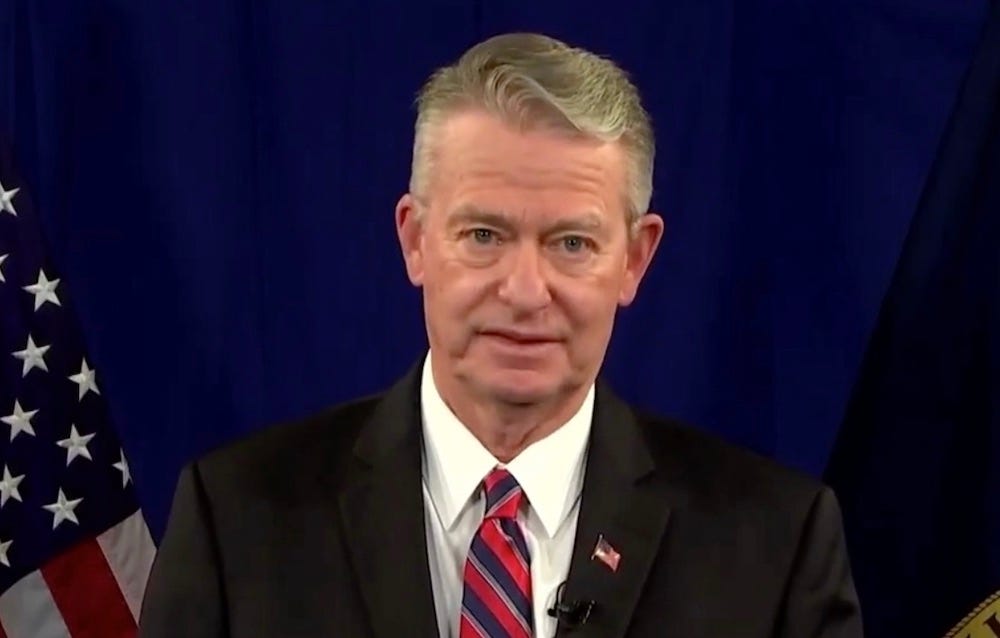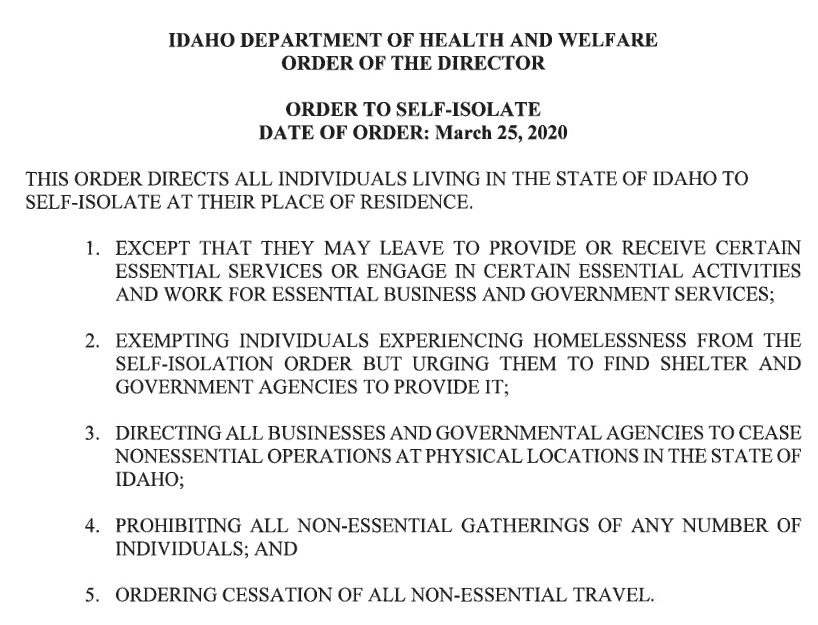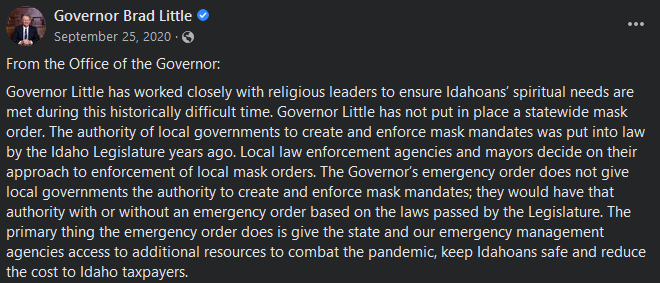(Note: This is part one of a series of posts about Governor Brad Little, focusing on the actions he has taken during the pandemic. Future posts will look at the response of Idaho conservatives, the challengers in the upcoming primary, and the need for a new perspective and strategy by the Republican Party.)
Bradley Jay Little was born in Emmett in 1954. He graduated from the University of Idaho in 1976 and went into business managing his family’s ranch. Brad Little has a famous pedigree: his father David Little served in the Idaho State Senate in the 1980s, and his grandfather Andrew Little was called “Idaho’s Sheep King” after emigrating from Scotland in 1884. By 1935, the Little family owned one of the largest ranches in the state.
Brad Little was appointed by Governor Dirk Kempthorne to fill a vacant seat in the State Senate for the Eighth District in 2001 and quickly rose through the ranks to become Chairman of the Senate Republican Caucus. In 2009, he was once again promoted via vacancy when Governor Butch Otter appointed him to the position of Lieutenant Governor, taking the place of newly-elected US Senator Jim Risch. Little twice won election to the position in his own right.
The Roman Republic had a system called the cursus honorum, meaning “course of honors,” which was the path to power for ambitious young men. It was expected that at a certain age, young men of the senatorial class in Rome would serve their time as quaestor, then aedile, then praetor, and then finally the capstone of a Roman political career, consul.
The United States has its own unspoken cursus honorum. Young men and women from the upper classes of our society graduate from prestigious universities and begin their political careers in the state legislature before moving along a path toward the governorship, a seat in the US House or Senate, or even the presidency.
Once you understand this path, you see it everywhere. For example, George P. Bush - son of former Florida Governor Jeb Bush, nephew of former President George W. Bush, and grandson of former President George H. W. Bush - began his own climb of the American cursus honorum in Texas when he was elected Lands Commissioner in 2015. He is currently running for state Attorney General, and surely has his sights set on the governor’s mansion in Austin. Politicians who faithfully follow the course hate it when a maverick tries to skip ahead - see the reaction of the Republican establishment to Donald Trump in 2016.
Brad Little has followed this course to a tee. When Governor Butch Otter decided not to seek election to a fourth term in 2018, Lieutenant Governor Little was his natural successor. Success in politics is often predicated on candidates paying their dues, not only to their party but to the big businesses and political action committees that contribute so much to their campaigns. Brad Little had spent decades building a network of powerful interests, so his campaign for the governorship was in cooperation with the existing power structure and political establishment in the state.
Even so, the 2018 primary campaign was not easy. Congressman Raúl Labrador, who was elected to the US Congress in the Tea Party wave of 2010, launched a primary challenge, as did businessman Tommy Ahlquist.
On May 15, 2018, Brad Little won the nomination of the Republican Party for governor with a mere 37.3% of the vote. Congressman Labrador received 32.6%, and Mr. Ahlquist 26.2%. Idaho being a solid red state, the November general election was a mere formality.
This race will forever be a “what if” in the minds of Idaho conservatives. If Ahlquist had not run, would Labrador have had enough support to win the nomination? It was something of a consolation when the Ada County Commissioners appointed Labrador to the Central District Board of Health in early 2021, resulting in the repeal of their onerous mask mandates. But imagine how much good might have been done with the solidly conservative Raúl Labrador running our state for the past three years.
I have heard numerous people suggest that Mr. Ahlquist remained in the race as a deliberate spoiler, to peel votes away from Congressman Labrador and allow Brad Little - the establishment favorite - to win. I cannot speak to the veracity of these claims, but these sorts of rumors are natural in close political battles. Some Democrats still blame Ralph Nader for George W. Bush winning the state of Florida in the 2000 presidential election.
The issue of multiple candidates possibly splitting the conservative vote and allowing the establishment favorite to win has resurfaced in the current primary campaign. I will take a closer look at this in a future post.
I was talking to a fellow Republican last week about Governor Little and the 2022 primary and I suggested that he is 75% of what we want out of a Republican governor. He got off to a good start in 2019, cutting taxes, cutting regulations, signing a bill preventing biological boys from competing on girls’ sports teams, and in early 2021 he signed a bill that would essentially ban abortion in the state if Roe v Wade were overturned.
These are all good things. Had it not been for the perfect storm of the coronavirus pandemic and the racial turmoil of the past two years, then Governor Little would have been seen as an above average Republican leader.
Yet these are changing times. Governing like it is still the 1990s, campaigning on tax cuts, and mouthing Reagan-era platitudes about small government are no longer enough. Taking advantage of the Covid-19 pandemic to unilaterally rule is unforgivable.
On March 13, 2020, before a single case of Covid-19 was detected in Idaho, Governor Little declared a State of Emergency. This action qualified the state for certain federal grants as well as giving the Executive Branch a wide latitude in acting outside the usual laws and statutes. One week after the emergency declaration, the Idaho State Legislature adjourned for the year.
Many state legislatures have a clause in their rules that allows them to call themselves back into session should an emergency arise that requires their attention. Not so in Idaho. According to the State Constitution, only the governor may call the legislature into session outside of its regular term. This is a very anachronistic tradition, dating back to the days of the medieval English monarchy and parliament. However, the law is what it is, and Governor Little refused to call the legislature, preferring to use his executive powers with zero oversight from the peoples’ representatives.
On March 25, Governor Little ordered nonessential businesses closed and citizens to stay home as much as possible. While you might think that your job is “essential” to putting food on your family’s table, our governor had different ideas.
With the political cover of the State of Emergency and the Stay At Home Order, the Central District Board of Health ordered a mask mandate for all businesses in June of 2020. During that summer, citizens in the Treasure Valley were discouraged from leaving their homes, prohibited from gathering with family and friends, and when they did go to the store for groceries or supplies were required to wear masks.
Governor Little and his bureaucrats defended these extreme acts, claiming that the Covid-19 pandemic was such an extraordinary emergency that it demanded extraordinary measures to save lives. The governor nevertheless still refused to call the legislature back into session. Without legislative oversight, Governor Little ruled Idaho like a king. While he did not go as far as many blue state governors in imposing medical tyranny, neither did he use his authority to protect the citizens of Idaho from the medical tyranny of petty bureaucrats and private businesses.
On Wednesday, September 23, 2020, Pastor Doug Wilson of Christ Church in Moscow, Idaho organized a protest against lockdowns and mask mandates. The leaders of this blue college town were having none of this sort of civil disobedience - police arrested three people for singing in public, citing several others. Governor Little refused to intercede in any way on behalf of the congregants, instead issuing the most mealy-mouthed statement he could possibly make, disavowing any responsibility for the freedom and liberty of his own citizens.
In May of 2021, Governor Little left the state for a meeting, leaving Lieutenant Governor Janice McGeachin in charge per the Idaho State Constitution. McGeachin had been a critic of Little’s handling of the pandemic response from the beginning, and used his absence to issue an executive order prohibiting businesses and public schools from forcing anyone to wear masks.
Little was outraged, and rescinded the order the moment he returned home. While some have accused Lt. Governor McGeachin of engaging in a pointless political stunt in the service of her own campaign for governor, I believe it demonstrated how Governor Little has had the authority to protect our liberties all along but has refused to use it.
When McGeachin pulled the same stunt again a few weeks later, Governor Little had Attorney General Lawrence Wasden issue a statement that, contrary to the State Constitution, the Lieutenant Governor no longer had executive power every time the Governor left the state. Wasden is another longtime machine politician and is currently seeking a fifth term as Attorney General. He is being challenged in the primary by former Congressman Raúl Labrador as well as Couer d’Alene attorney Art Macomber. I will have more to say about this race in a future newsletter.
In November of 2021, the Biden Administration issued a mandate requiring large businesses to force their employees to take the Covid-19 vaccines. Governor Little criticized this mandate and joined Idaho to several lawsuits seeking to block this unconstitutional and immoral order. This is all well and good. However, Little has done nothing to prevent private companies from enforcing the order of their own accord. Little claimed that to interfere in private business would violate the spirit of conservatism. I am sure that the fact that Idaho’s biggest businesses and healthcare conglomerates have given large contributions to his campaigns did not figure into his position.
In part two, I will look at how the political establishment, big businesses, and the healthcare industry have invested in Governor Little and the rest of Idaho’s political leaders, as well as how Little and our leaders are ignoring the pernicious issues of Critical Race Theory and extreme gender ideology in our public school system.
If you enjoy this sort of analysis, please share and subscribe!







